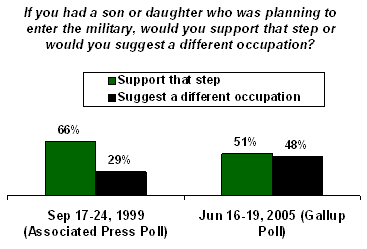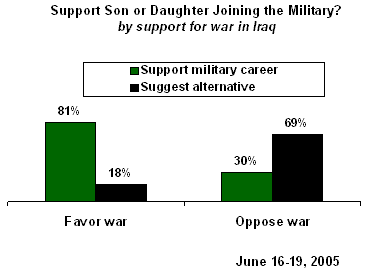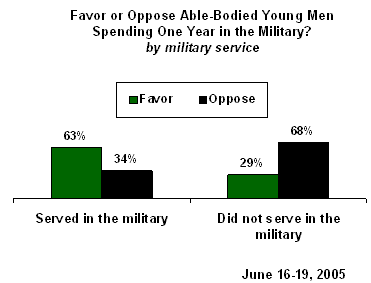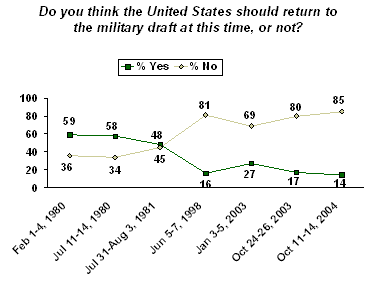GALLUP NEWS SERVICE
PRINCETON, NJ -- While the U.S. Army has struggled to meet its monthly recruitment quotas in the midst of the Iraq war, a new Gallup Poll finds only a bare majority of Americans would support their child's decision to enter the military, while a substantial proportion would suggest their child try a different occupation. That is a significant decline when compared with previous data on this question from 1999. The poll also finds most Americans oppose mandatory military training for young men; something the public consistently favored a half-century ago. Additionally, an October 2004 Gallup survey showed only minimal support for re-instituting the military draft.
The June 16-19 poll asked Americans how they would react if they had a son or daughter who was planning to enter the military. Fifty-one percent say they would support that step, while 48% would suggest a different occupation. When The Associated Press asked the same question in 1999, 66% of Americans said they would support their child's decision, while only 29% would suggest their child try something else.

This reluctance to support a military career is not a reflection on the military itself. The military remains the most positively rated institution according to Gallup's annual confidence in institutions poll, with more than 7 in 10 expressing confidence. In fact, slightly more Americans express confidence in the military today (74%) than did so in 1999 (68%). A more likely explanation probably lies in the realization that military service is more dangerous today given the ongoing war in Iraq.
Americans' views on the war are strongly related to their willingness to support a military career for their son or daughter. Among those who favor the war with Iraq, 81% say they would support their child if he or she decided to enter the military and 18% would suggest a different occupation. But among those who oppose the war, just 30% would support their child's wishes while 69% would suggest an alternate career path.

That relationship persists even when taking into account one's party affiliation, which is strongly related to both support for the war and for a hypothetical military career for one's child. Overall, Republicans are more likely to favor the war and to say they would support their child's wanting to enter the military. However, the vast majority of Republicans who oppose the war say they would try to talk their child out of a military career. And while Democrats are generally opposed to the war and a military career for their children, Democrats who favor the war overwhelmingly say they would support their children if they opted for military service.
There are only slight differences between those who have personally served in the military and those who have not. Fifty-six percent of veterans would support their son or daughter if they expressed a desire to enter the military, as would 49% of those who did not serve in the military.
Mandatory Service?
To date, few have suggested compulsory military service for young men and women in the United States as a remedy to the lag in recruitment. That may be, in part, because of the realization that public support for required military service is lacking.
The current poll updated a Gallup question on mandatory military service, last asked 50 years ago. Currently, 35% of Americans favor and 62% oppose "requiring every able-bodied young man in this country when he reaches the age of 18, to spend one year in military training and then join the reserves." During the 1950s, at least a majority of Americans favored mandatory training, with support climbing as high as 76% in May 1955.
Would you favor or oppose requiring every able-bodied young man in this country when he reaches the age of 18, to spend one year in military training and then join the reserves?
|
Favor |
Oppose |
No opinion |
|
|
% |
% |
% |
|
|
2005 Jun 16-19 |
35 |
62 |
3 |
|
|
|
|
|
|
1955 Dec 8-13 |
69 |
23 |
8 |
|
1955 May 12-17 |
76 |
18 |
6 |
|
1955 Feb 10-15 |
71 |
20 |
9 |
|
1955 Jan 20-25 |
73 |
22 |
5 |
|
1954 Dec 2-7 |
75 |
22 |
3 |
|
1954 Aug 26-31 |
72 |
22 |
6 |
|
1952 Feb 28-Mar 5 |
60 |
33 |
7 |
|
1951 Dec 9-14 |
56 |
28 |
16 |
Those with prior military service are much more likely to favor mandatory military training than those who have not served. Veterans favor compulsory service by a 63% to 34% margin, while non-veterans oppose it by a 68% to 29% margin.

The public would be even less likely to favor the re-institution of the military draft. An October 2004 CNN/USA Today/Gallup poll found that just 14% of Americans said the United States should "return to the military draft," while 85% said it should not. In recent years, support for the draft has been about as low as it is now, though it was slightly higher in January 2003, a few months before the Iraq war began. In the early 1980s, just a few years after the draft was suspended, support was much higher. In early 1980, then-President Jimmy Carter re-instituted the Selective Service registration requirement as a partial response to the Soviet invasion of Afghanistan.

Survey Methods
These results are based on telephone interviews with a randomly selected national sample of 1,006 adults, aged 18 and older, conducted June 16-19, 2005. For results based on this sample, one can say with 95% confidence that the maximum error attributable to sampling and other random effects is ±3 percentage points. In addition to sampling error, question wording and practical difficulties in conducting surveys can introduce error or bias into the findings of public opinion polls.
21. If you had a son or daughter who was planning to enter the military, would you support that step or would you suggest a different occupation?
|
Support |
Suggest |
No |
|
|
|
|
|
|
|
2005 Jun 16-19 |
51% |
48 |
1 |
Trends for Comparison: Associated Press Poll
|
Support |
Suggest |
No |
|
|
% |
% |
% |
|
|
1999 Sep 17-24 |
66 |
29 |
5 |
|
1999 Aug 18-22 |
66 |
29 |
5 |